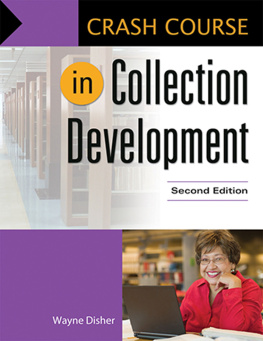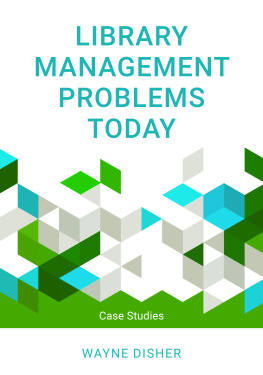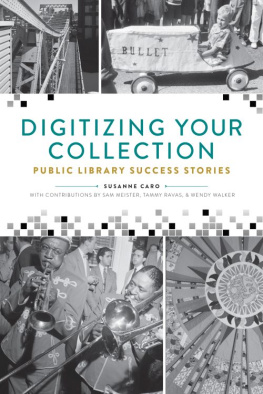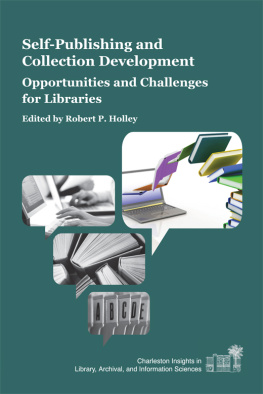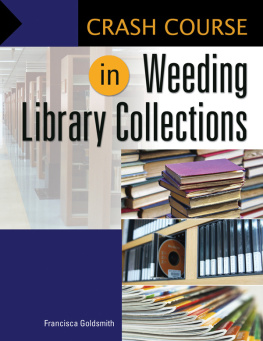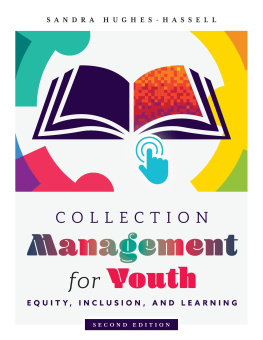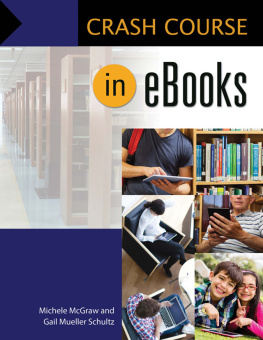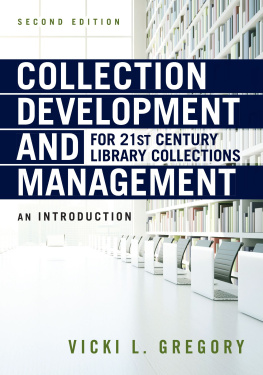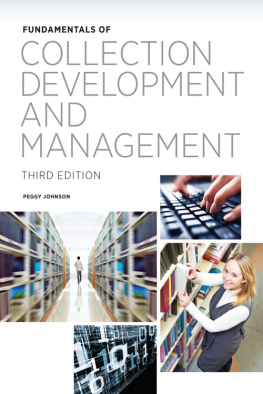Crash Course in Collection Development
Recent Titles in
Libraries Unlimited Crash Course Series
Crash Course in Storytime Fundamentals
Penny Peck
Crash Course in Cataloging for Non-Catalogers: A Casual Conversation on Organizing Information
Allison G. Kaplan
Crash Course in Library Services to People with Disabilities
Ann Roberts and Richard Smith
Crash Course in Library Services to Preschool Children
Betsy Diamant-Cohen
Crash Course in Public Library Administration
Wayne Disher
Crash Course in Genealogy
David R. Dowell
Crash Course in Family Literacy Programs
Rosemary Chance and Laura Sheneman
Crash Course in Services for Seniors
Ann Roberts and Stephanie G. Bauman
Crash Course in Strategic Planning
Stephen A. Matthews and Kimberly D. Matthews
Crash Course in Gaming
Suellen S. Adams
Crash Course in Dealing with Difficult Library Customers
Shelley E. Mosley, Dennis C. Tucker, and Sandra Van Winkle
Crash Course in Children's Services, Second Edition
Penny Peck
Crash Course in Collection Development
Second Edition
Wayne Disher
Crash Course
Copyright 2014 by Wayne Disher
All rights reserved. No part of this publication may be reproduced, stored in a retrieval system, or transmitted, in any form or by any means, electronic, mechanical, photocopying, recording, or otherwise, except for the inclusion of brief quotations in a review, without prior permission in writing from the publisher.
Library of Congress Cataloging-in-Publication Data
Disher, Wayne.
Crash course in collection development / Wayne Disher. Second edition.
pages cm. (Crash course)
Includes bibliographical references and index.
ISBN 978-1-61069-813-9 (paperback) ISBN 978-1-61069-814-6 (ebook)
1. Collection development (Libraries)United States. 2. Small librariesCollection developmentUnited States. I. Title.
Z687.U6D57 2014
025.2'1dc23 2014018813
ISBN: 978-1-61069-813-9
EISBN: 978-1-61069-814-6
18 17 16 15 14 1 2 3 4 5
This book is also available on the World Wide Web as an eBook.
Visit www.abc-clio.com for details.
Libraries Unlimited
An Imprint of ABC-CLIO, LLC
ABC-CLIO, LLC
130 Cremona Drive, P.O. Box 1911
Santa Barbara, California 93116-1911
This book is printed on acid-free paper 
Manufactured in the United States of America
Contents
Orientation to Collecting
Any person new to the world of collection development will soon find that his or her duties are constantly filled with irony and contradiction. There are often more questions than there are answers, and more stress than there is confidence. I often tell my collection development staff that in order to be successful in building a collection for a public library, they need to become comfortable with being uncomfortable. The simple fact is that any collection developer in a public library will face a great many challenges and problems. These challenges come in a multitude of formslack of adequate funding, the inability to find materials you think your community needs, lack of time necessary to devote to reading reviews, and the inability to get the material you have purchased out to your users in a timely manner are only a few. The collection developer faces more disappointment and frustration than almost any other staff member in the library.
So why would anyone in his or her right mind ever want to take on this daunting task? Because there is no more rewarding feeling in the library profession than seeing a book you purchased for your community fly off the library's shelves. It is that euphoric feeling you'll get from knowing that your efforts have made a significant impact on another individual that will motivate you (as it does so many of your colleagues) to continue to face headaches and more heartaches in the world of collection management.
When an item you have selected for your collection meets an exact information need of a user, and that user leaves your library feeling that his or her tax dollars have been well spent, then the challenges and problems you faced in getting to that point suddenly become insignificant, and your efforts heroic. Helping you get past those challenges and problems in a logical and successful fashion is precisely what this book intends to do. While this book's primary audience is the library professional with little, if any, experience in building public library collections, there is certainly pragmatic value for those professionals who have been reintroduced to the world of collection development. Whether you're a novice collection developer or you've already experienced some of the collection development process, the lessons, reminders, and tips in this book will provide a necessary framework through which you, the collection developer, can feel assured that you've given careful and rational consideration to the basic principles so many of your colleagues have successfully used over the years in making public library service one of our society's most respected and well-used institutions.
You might be surprised to know that you already have the skills you need to be a successful collection developer. Our ancestral roots as hunter-gatherers most likely gave us a tendency toward forage and storage of the things we hunted and gathered. Perhaps this desire has somehow made it into our genetic makeup, our DNA. Taken to its extreme then, we must already have the expertise needed to become professional collectors. Whether collecting coins, stamps, dolls, art, spoons, Elvis memorabilia, Beanie Babies, or some other interesting object, we inherently partake in virtually the same collection development process used in our public libraries.
For example, think about your own personal collection hobby. Perhaps you collect postcards. You can easily identify some obvious basic steps involved in your informal postcard-collecting activity. The following questions most likely guide your personal collecting interests:
- Just what do I want to collect? In the example we are using, you might say, "I'm collecting postcards." But is it really that simple a question? What is a postcard? Who defines a postcard? Do all postcards come in certain standard sizes, shapes, paper? Asking yourself, "What will constitute this collection, and who will define what my collection is?" will be your first important step.
- What are my collection preferences? Defining the actual scope of your collection will be an important next step. For example, if you are a postcard collector, which postcards do you want to collect more than any other? Do you want to collect primarily postcards from Europe, or are you looking solely for postcards from all 50 states of the United States? Should your postcards be blank or should they have a postage stamp with a postmark? The act of identifying what will (and will not) be a part of your collection is a critical component to all collectingwhether it be informal or as part of a formal collection activity in a library.
- How much can I afford? Collectors must always worry about money! Let's say that, as a postcard collector, you would certainly like to buy just about every postcard you see. However, the fact is that you will likely need to determine how much money you can actually afford to allocate to your hobby. After all, you still have your living expenses and other financial obligations to meet before you see how much money is left to purchase your postcards. More important, once you determine how many postcards you can afford, which ones should you buy firstthat is, which ones have a higher priority? In most public libraries, funds are extremely limited. Before determining how much money to spend on library material, staff members have to be paid, overhead costs such as heating, electricity, and telecommunications must be met, and equipment has to be purchased. From the remaining money, collection developers must determine which material to buy first and how to distribute funds among the various service areas of the library.

